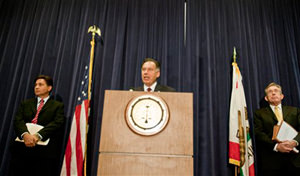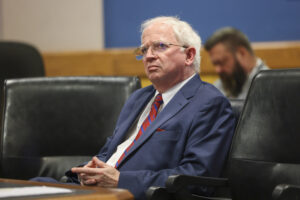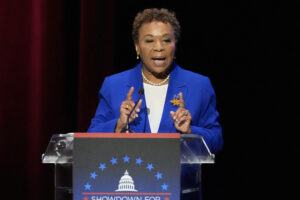When Protest Becomes a Crime
Is rudeness a crime, punishable by prison? Yes, says a district attorney as he pursues the prosecution of 11 Muslim students who disrupted a speech by the Israeli ambassador.Is rudeness a crime, punishable by prison?
Is rudeness a crime, punishable by prison? Yes, says a district attorney as he pursues the prosecution of 11 Muslim students who disrupted a speech by the Israeli ambassador.
The incident on the University of California’s Irvine campus is the Arab-Israeli conflict in miniature, set in legendarily conservative suburban Orange County. The area has substantial numbers of Muslim and Jewish residents, and this episode reflects the intense enmity felt by both sides.
Most important, it raises this question: Why should a politician-law enforcement officer, Orange County District Attorney Tony Rackauckas, have the power to limit free speech on a university campus?
Early this month, Rackauckas charged each of the students with one misdemeanor count of conspiracy to disrupt the meeting and another count of disturbing the meeting. If convicted, they face sentences ranging from probation with community service to six months in jail.
The incident occurred a year before, on Feb. 10, 2010. Watching a video of the event, I thought the protesters were loud and uncivil, as protesters often are.
Soon after Michael Oren, the Israeli ambassador to the United States, began his speech, a student rose and shouted. Although his words were unintelligible on the video, I assume they were anti-Israel. Campus police escorted him out, and he went peacefully. Ten more students followed the same routine, rising, shouting, finger-pointing and generally making it difficult for Oren to continue. Each was escorted out by campus police. Nobody resisted. After the 11th student left, a large group of Muslim students rose and walked out of the meeting, some of them smiling or shooting pictures with their cell phones. As they left the meeting room, a man, apparently a university official, shouted at them, “You are failing your exams, you are failing.”
Nobody was hurt or resisted the police. Nothing was damaged. There was no violence. After the students left, Oren finished his speech, which, judging from the video, was an unsurprisingly one-sided defense of the Israeli government.
The university brought campus disciplinary charges against the students, and some form of punishment—confidential under privacy laws—has been handed out. For its alleged role in organizing the protest, the Muslim Students Union was given a one-year suspension, followed by probation, but later the university reduced the suspension to one academic quarter. The MSU has appealed the disciplinary action.
That should have been the end of it. Instead, District Attorney Rackauckas brought the case to the grand jury and then filed the conspiracy charges, a felony. The action was cheered by elements of the Jewish community, which had long demanded a stronger university crackdown on the MSU. The Simon Wiesenthal Center called the D.A.’s action “a watershed” and commended him.
I talked to Peter Bibring, an attorney for the American Civil Liberties Union of Southern California, who said that before the UCI case he had never heard of a prosecution of this kind. “We were not aware of [such a disturbing] charge or the conspiracy charge being levied against any nonviolent protest by any student,” he said.
He acknowledged that there’s been much argument over the Muslim students’ tactics. “Whatever position you take on that, to bring serious criminal charges against the students and force them to face prosecution, trial and possible criminal conviction is a bad thing for speech in California. … This is a troubling precedent. If students in universities across California worry about whether the D.A. thinks they have gone one step over the line in their speech, they will not speak at all. … This is not what we want for our colleges and universities. We want them to be places where they [students] are passionate and energetic about ideas and engage in vigorous debate.”
Professor Erwin Chemerinsky, dean of the UCI Law School, told me that he didn’t think the case involved First Amendment free speech rights. “Nobody has the right to come into my class or go to the city council and disrupt it. It was wrong and they were punished [by the university],” he said. But he thinks that for the D.A. to elevate the case to criminal courts level is wrong.
He put it this way in an article for The Orange County Register: “It is inexplicable why the scarce resources of the criminal justice system are being used for this especially since the students have already been punished by the university for their disruptive behavior.”
Protests are part of student life, although they were much more common in the 1960s and ’70s than today. In those days, plenty of people were arrested on campuses, 773 of them one night during a Free Speech Movement protest at UC Berkeley. But in that case they were charged with a specific criminal offense, trespassing, for refusing to leave the administration building.
The Irvine students committed no such offense. Speech was their only offense. If Ambassador Oren had been swifter on his feet, he might have turned the evening against the hecklers. I’m sure he’s seen ruder crowds in Israel.
If the university had its way, this incident would have receded in importance, taking its place among the many Jewish-Muslim arguments that are part of campus life at Irvine and other schools where Jews and Muslims come together. Instead, District Attorney Rackauckas has escalated the case, possibly extending it for months, feeding the area’s anti-Islam hysteria.
Dean Chemerinsky thinks the case will be settled out of court. “This case isn’t going to trial,” he said. “That’s my prediction.”
I hope so. Meanwhile, Rackauckas should watch television broadcasts from Cairo for a view of young Muslim society. It might change his attitude toward Orange County’s young Muslims, who are among the people he has sworn to protect.
Your support matters…Independent journalism is under threat and overshadowed by heavily funded mainstream media.
You can help level the playing field. Become a member.
Your tax-deductible contribution keeps us digging beneath the headlines to give you thought-provoking, investigative reporting and analysis that unearths what's really happening- without compromise.
Give today to support our courageous, independent journalists.






You need to be a supporter to comment.
There are currently no responses to this article.
Be the first to respond.